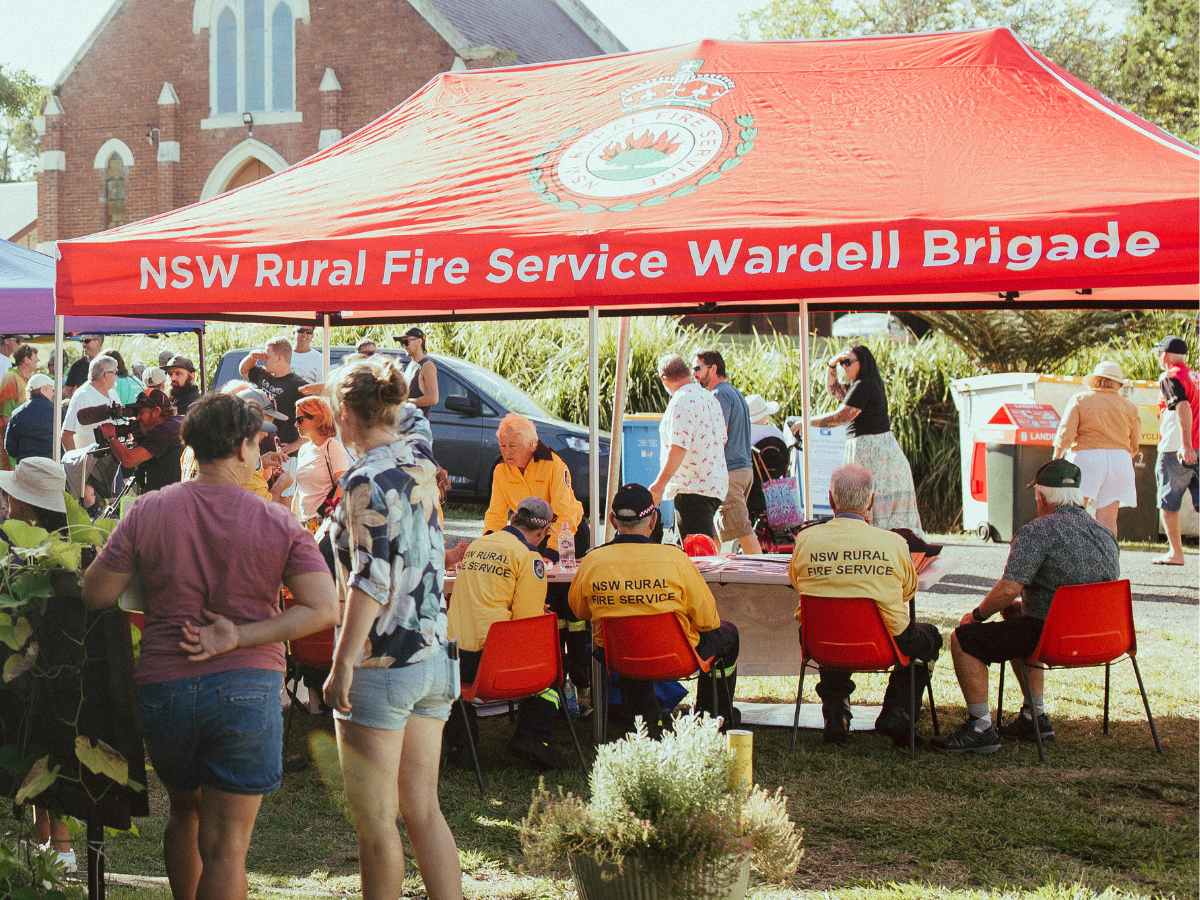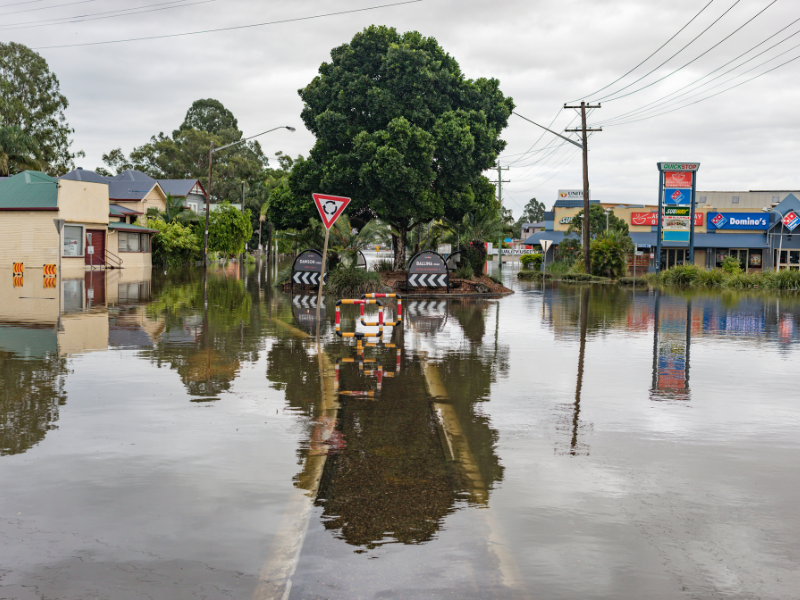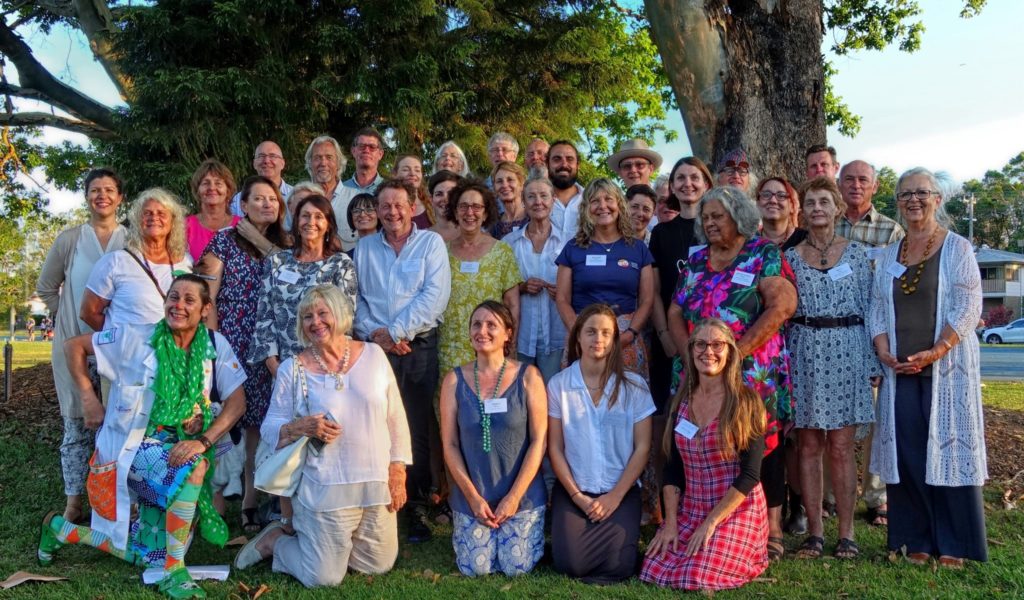Foundation for Rural & Regional Renewal (FRRR)
The work of the Wardell Community Organised Resilience Effort (CORE) is an example of how a small town can rally in the face of a natural disaster and be ready for disasters to come. Most days, Wardell is an idyllic spot to live. Lush, green and quiet on the banks of the Richmond River in the Northern Rivers region of NSW. But in 2022, floods devastated the town and others nearby. Wardell had never flooded before, and no one was prepared.
Wardell CORE was set up as a resource centre for emergency donations. Bedding, blankets, clothes, food, medical supplies, water, torches, batteries and tents were all gratefully received. The need was immense. Two years on, Wardell CORE’s primary purpose is still helping affected people. Some are still homeless and many struggle with mental health issues, including PTSD. Their other main aim is to make sure the community is never impacted in the same way again.
Planning for the way forward

During the 2022 floods, mobile and internet telecommunications were impacted, meaning Wardell and the surrounding communities had limited or no communication in many areas until power could be restored or services fixed. Having no communications during a disaster created all kinds of problems – the emergency services people couldn’t share vital information, residents were cut off from family and friends, and there were any number of complexities around ongoing recovery.
After the flood receded, Wardell CORE immediately started planning for the next one, and detailed planning identified a need for a way for the community to stay informed, given the power outage lasted for two weeks or more. CB radio was the solution. They received a $10,000 grant from FRRR through Telstra’s Connected Communities program that funded the purchase of 10 hand-held devices and two base stations, as well as funds left over to support the community with the appropriate training. Through additional fundraising, they were able to install a relay station that helps to extend the signal as far as possible to provide radio reception throughout town and with the nearby communities of Woodburn and Coraki up-river, and Ballina down-river.
Where to next?
The organisation plans to distribute more radios throughout the region to anticipate flood events as widely and comprehensively as possible. Another resilience move they made was installing a Starlink service that uses a network of satellites to provide internet coverage, and installing onsite battery storage so that they will have internet in the event of future power outages.
The team behind Wardell CORE recognises that locals in the region experience high levels of anxiety about weather events, but the low level of digital literacy in the community is a real barrier to disaster preparedness. To resolve this, they’re looking at establishing a program that teaches people how to access and interpret weather apps and other related platforms.
A spokesperson for Wardell CORE explained the impact of the grant they received.
“Without the FRRR grant from Telstra’s Connected Communities program, we would never have been able to put our disaster preparation plans into action. The lessons learned from the 2022 floods meant we knew what technology we needed and where it should be located. But our reliance on small donations meant we could never have afforded it. Now we have the communications we need to feel confident about our ability to protect our people, physically and mentally, from any flood events in the future.”
“The NRCF Board and staff certainly value the long-term relationship with FRRR, which is so important to us as a rural and regional Foundation. The support for NRCF’s community impact and grants team has been essential to achieve impact in the community.” Sam Henderson, CEO, NRCF
Northern Rivers Community Foundation (NRCF) was established in 2004 to connect people who care with local causes that matter, to improve community wellbeing for the Northern Rivers region of NSW. They have one of the largest footprints of any community foundation in Australia, covering from Tweed to Grafton, from the ocean all the way up past Kyogle, Woodenbong and Casino. NRCF is dedicated to improving the lives of those less fortunate in their community, either from economic circumstances, mental illness, disability, learning difficulties or drug / alcohol addiction. More recently their focus has been to support their community to navigate their disaster recovery journey following bushfires and then widespread flooding events across the region in early 2022.

NRCF has held a Fundraising Account partnership with FRRR since 2017 to attract tax-deductible donations, enabling them to help community organisations meet increasing demands on their services and work together to build resilience across the community.
Initially they raised funds through a general Community Fund, and in 2020 established the Resilience & Regeneration Fund to raise funds specifically to support disaster recovery and preparedness in their region. The Fund responds to the increasingly frequent natural disasters affecting the region and the global pandemic. Recognising that these are not isolated events, and that resilience and regeneration are integral to a sustainable and prosperous region, they wanted to attract as much money as possible.
As at 30 June 2023, NRCF has raised $1,171,600 via these two Funds. In 2022, they announced a record distribution of $327,177 to 49 recipients across the seven LGA’s of the Northern Rivers. This was supported by distributions totalling more than $162,000 from their FRRR Fundraising Account in FY22. Projects span across disadvantage, housing and homelessness, recovery and resilience, and the environment.
NRCF will also be looking to use the funds raised through the Resilience & Regeneration Fund to respond in a meaningful and impactful way to the devastation brought about by the two 2022 flooding events that occurred in quick succession through their Annual Community Grants program. Informing their response is their ongoing research project to understand the issues and conditions impacting community recovery with a view to better support local not-for-profits and their activities into the future. In May 2023 they released their second flood impact report ‘Research, Respond, Recover: A year on from disaster’ which offers valuable insights across a range of indicators about how the community is recovering. It highlights gaps in funding for medium to longer term recovery, and ongoing key issues of concern around health and wellbeing, housing and homelessness.
With this increase in support comes a need for increased resourcing. Fortunately, NRCF has also received donations via their Fundraising Account specifically to support their operational and staffing costs through their General Fund. As a result, the role of Grants and Community Impact Manager has been introduced, which will boost their capacity, enabling them to expand their community grant programs and supporting them to broaden their reach.
Sam Henderson, NRCF’s CEO, said ‘The NRCF Board and staff certainly value the long-term relationship with FRRR, which is so important to them as a rural and regional Foundation. The support for NRCF’s community impact and grants team has been essential to achieve impact in the community.’ The need to respond to disasters has now increased so much that they’ve also recruited a part-time Grants Administration Officer to support the Community Impact Manager.
Northern Rivers Community Foundation (NRCF) was established in 2004 with the purpose to connect people who care with local causes that matter, to improve community well-being for the Northern Rivers region of NSW. They provide annual grants to a wide range of community groups for projects ranging from mental health, to growing fresh food to ensure children are well nourished and can learn, to distributing Back to School vouchers. NRCF is particularly focused on supporting grand-carers, supporting riding for the disabled and palliative care.

FRRR’s NRCF Community Foundation Account helps facilitate donations for a number of their partners and enables them to leverage FRRR’s tax deductible status to maximise their donations. In 2019 they distributed some $114,000 in grants including to the Bangalow Koalas to set up a wildlife corridor; provided medical equipment to Tweed Palliative Support and Wedgetail Retreat Community Hospice; enabled the Bunjum Aboriginal Corporation to refresh their unit used as a transition house for women fleeing violence; provided professional development for tutors and support workers at Sprung Integrated Dance Theatre; and supported a youth program for first offenders with NSW Police participation.

